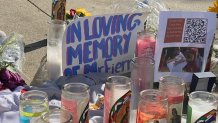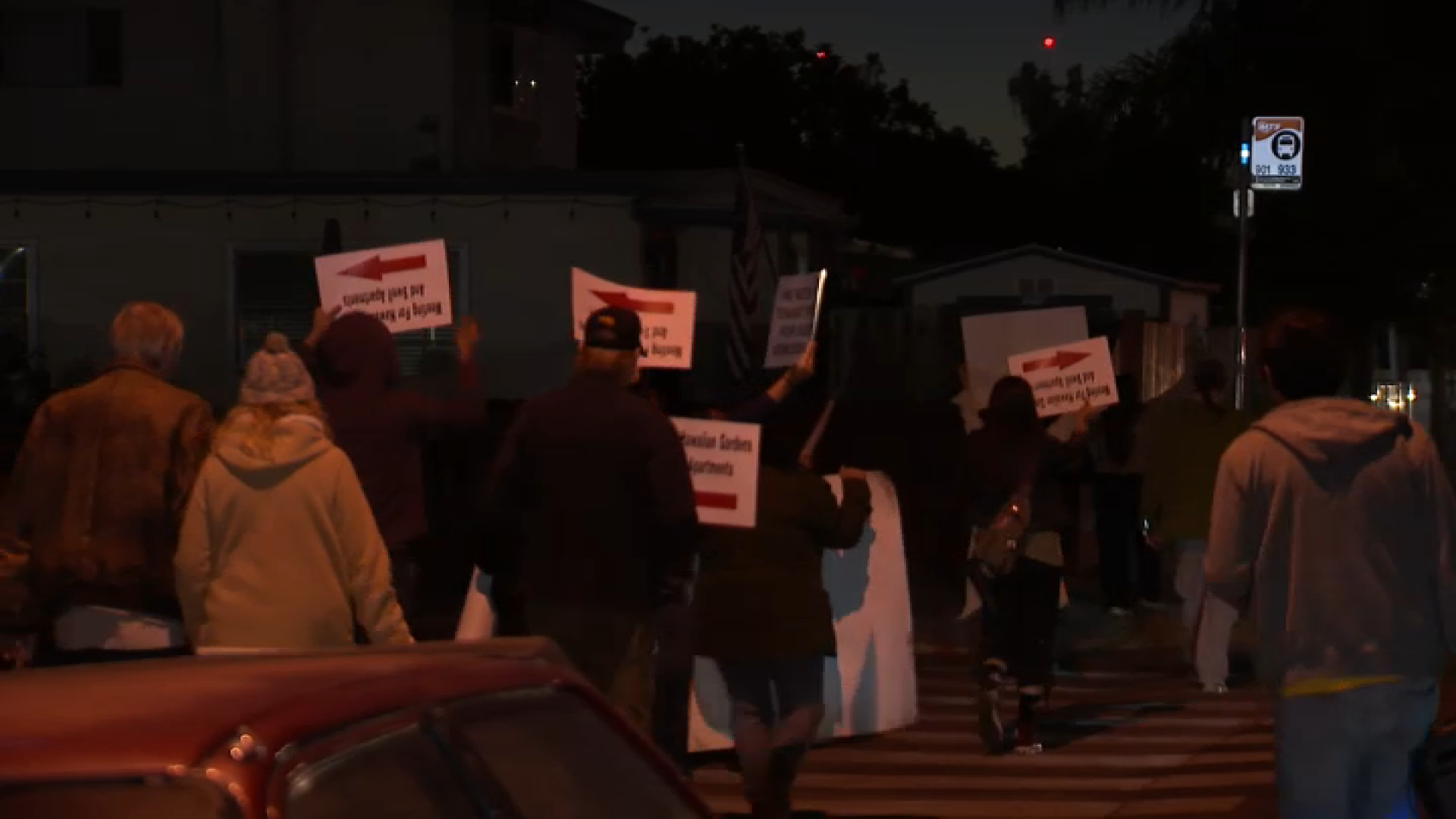As the sun came out on a Kansas Street driveway in North Park on Thursday, a memorial of love and remembrance continues to grow for a teacher, coach and friend to many at Cathedral Catholic High School.
Flowers, candles, sports jerseys and a class ring mark the place where Mario Fierro, 37, was shot and killed on his way to teach his class the morning of Feb. 1, 2021.
One anonymous card reads, “I did not know you, we’d only said hello politely once… I heard the shots outside my door and saw you take your last breaths. I pray you did not suffer and that your loved ones can find peace.”

San Diego Police have released few details behind their murder investigation, only that they arrested a single person suspected of the heinous crime: 30-year-old Jesse Alvarez.
On the day Alvarez’s arrest was announced, NBC 7 was first to uncover court records showing the fiancée of Fierro had a past relationship with Alvarez that ended with her scared for her life and seeking the protection of the court through a restraining order. Alvarez disputed the woman’s story, telling the court it was defamatory; he had never abused the woman in any form.
The woman’s request was denied, as Judge Daniel S. Belsky found the evidence presented by both sides “a tie, and the tie would be in favor of (Alvarez.)” (To read more about what NBC 7 found, click here or below.)
This case is now commanding the attention of domestic violence advocates across the state, who call this tragedy a textbook example of how the justice system falls short of understanding domestic abuse, much less protecting victims.
It also brings to light the staggering number of domestic violence restraining orders requested each year in San Diego County alone, a number that has risen in the last two years.
Local
While the circumstances behind the North Park murder are shocking and saddening, they are not surprising, according to Jacquie Marroquin with the California Partnership to End Domestic Violence. Marroquin said that getting a domestic violence restraining order is a lot harder than people generally think.
“The ways in which the court rules are laid out -- which are different in every county -- is that you have to follow all of these steps in order to be able to tell your story,” Marroquin said. “And so, the ‘telling your story’ is the most important piece of the restraining order petition.”
Marroquin added, “If you are not able to really tell a story where you could show immediate danger, there would be a high likelihood your restraining order would be denied.”
In the woman’s restraining order petition against Alvarez, she laid out events of Alvarez’s behavior in the months following their break-up in September 2019. The petition accused Alvarez of using different phone numbers after she blocked his number, calling her 20 to 30 times. Also, cyberstalking on social media and following her to public places. At one point, the woman called police after her surveillance cameras captured Alvarez attempting to get into her home with an old key.
Alvarez responded to the woman’s allegations by filing his affidavit, stating her recounting of events were “false or overexaggerated,” writing in part, “She is intentionally acting out of spite, hate and malice in order to personally hurt me, damage my reputation...”
In the court clerk’s notes for the hearing on extending the restraining order, Judge Belsky sided with Alvarez, finding him “very sincere” and that he just “needed time to process his hurt and the reality that the relationship was over.”
In responding to the evidence laid out in the woman’s restraining order request, the Judge said she “did not meet her burden of proof that abuse has occurred within the meaning of the Domestic Violence Protection Act (DVPA).”
According to the Prevention of Domestic Violence Act, abuse is classified as acts of physical and sexual abuse, but also “abuse is not limited to the actual infliction of physical injury or assault.” California’s Judicial Court’s website states restraining orders are meant to “protect someone from being physically or sexually abused, threatened, stalked, or harassed.”
Marroquin believes the justice system has yet to fully understand the nuances of domestic abusers, especially after reviewing this specific case.
“People who cause harm tend to be socially charming people,” Marroquin said. “In this situation, it was very clear to me that the person who caused harm, in this case, was able to convince a judge that they were equally credible as the survivor was.”
The hearing’s notes stated that Alvarez had convinced members of his church congregation, his pastor, and his relatives to call his ex-girlfriend and persuade her to give their relationship a second chance.
Marroquin pointed to examples like this as someone seeking control and that winning the support of a judge can only encourage an abuser.
“In that situation, I think the criminal legal system really can do a lot more work to help identify the pattern of behavior, of abusive behavior, that someone uses in order to have power and control," she said.
That’s why Marroquin said restraining orders are not the best or most useful for survivor safety. Still, San Diego County has seen a rise in partners seeking out this line of defense.
According to data obtained by NBC 7 Investigates, in the year 2020 alone, amid a raging pandemic, more than 7,700 restraining order requests were filed in San Diego County -- a 4% increase from the year prior. A spokesperson for San Diego County’s court system said it does not track the number of restraining order requests granted or denied.
But Marroquin said denials are both common and incredibly dangerous.
And for those that manage to succeed in getting a restraining order, it doesn’t always shield them from violence.
A spokesperson for the San Diego County District Attorney’s office said, “There was a current or past civil restraining order in about 20% of the domestic violence homicide cases reviewed in 2020.” Meaning in one out of every five domestic violence deaths, the victim had court protection.
Marroquin points out there are steps people can take if their request for a restraining order is denied. Petitioners can appeal to a judge’s ruling or reapply for an order if there is a new abuse incident.
But before doing that, and ideally, before filing a restraining order request, she urges victims to reach out to a local domestic violence resource center or to a crisis hotline to make a safety plan.
The National Domestic Violence Hotline is 1-800-799-SAFE (7233)
Local prosecutors have also come up with a list of local shelters, advocates and resources here at this link.
For the charges of murdering Mario Fierro, Alvarez has yet to enter a plea. A court arraignment is set to take place on Feb. 19, 2021. At that time, more details may come to light on the motive behind the shooting.

Marroquin believes the story is an example of why the courts need to do a better job of listening to survivors, recognizing patterns of potential abuse, and re-calibrating society’s approach to the problem.
“Survivors will often go from crisis to crisis because all we are doing is putting a band-aid on the larger issue,” Marroquin said. “The larger issue is really changing the norms and behaviors of people who cause harm.”



